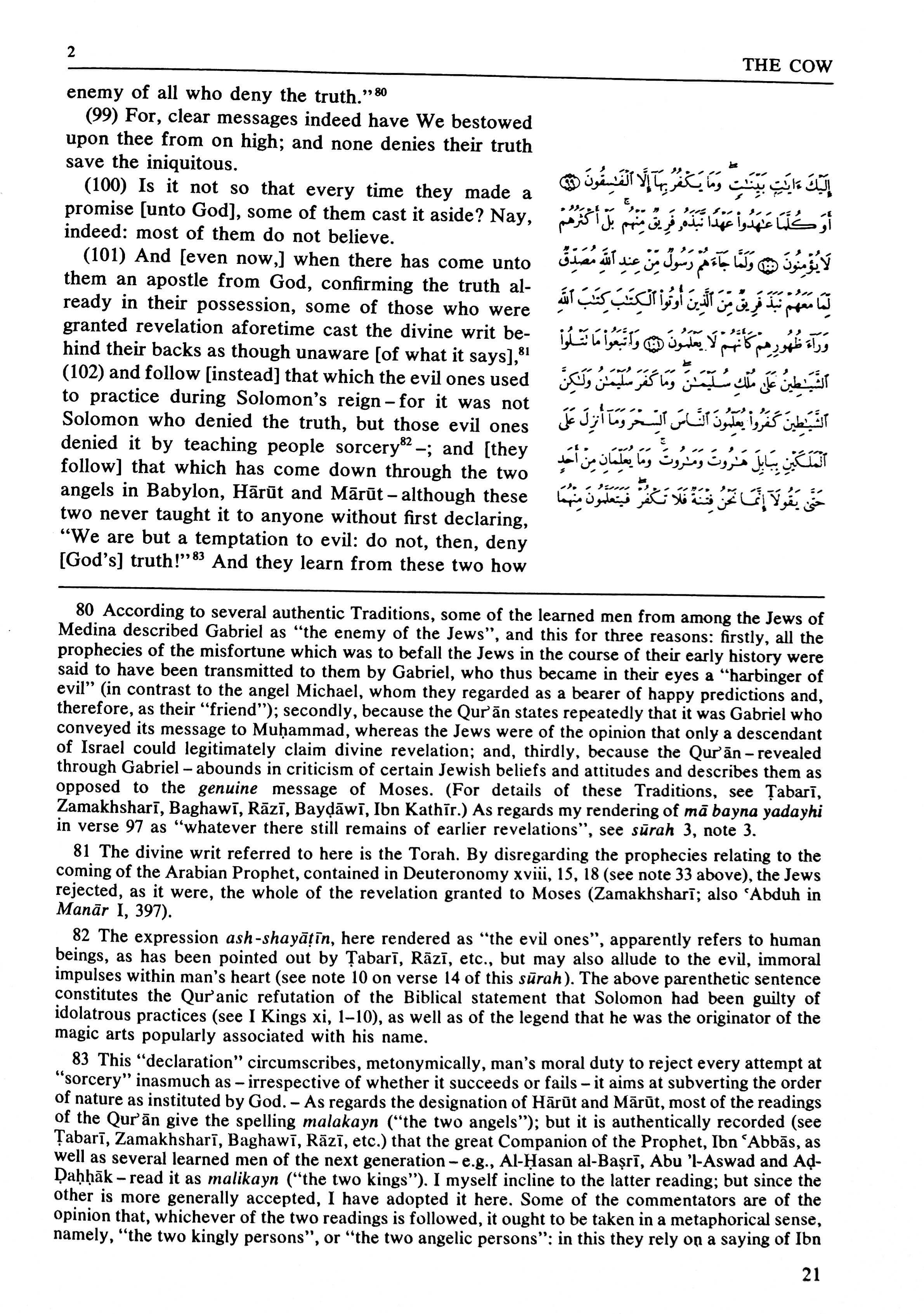Muhammad Asad, The Message of the Qur’ān; Translated and Explained by Muhammad Asad (1980)
enemy of all who deny the truth.”80
(99) For, clear messages indeed have We bestowed upon thee from on high; and none denies their truth save the iniquitous.
(100) Is it not so that every time they made a promise [unto God], some of them cast it aside? Nay, indeed: most of them do not believe.
(101) And [even now,] when there has come unto them an apostle from God, confirming the truth already in their possession, some of those who were granted revelation aforetime cast the divine writ behind their backs as though unaware [of what it says],81 (102) and follow [instead] that which the evil ones used to practice during Solomon’s reign – for it was not Solomon who denied the truth, but those evil ones denied it by teaching people sorcery 82 –; and [they follow] that which has come down through the two angels in Babylon, Hārūt and Mārūt – although these two never taught it to anyone without first declaring, “We are but a temptation to evil: do not, then, deny [God’s] truth!”83 And they learn from these two how
80 According to several authentic Traditions, some of the learned men from among the Jews of Medina described Gabriel as “the enemy of the Jews”, and this for three reasons: firstly, all the prophecies of the misfortune which was to befall the Jews in the course of their early history were said to have been transmitted to them by Gabriel, who thus became in their eyes a “harbinger of evil” (in contrast to the angel Michael, whom they regarded as a bearer of happy predictions and, therefore, as their “friend”); secondly, because the Qurʾān states repeatedly that it was Gabriel who conveyed its message to Muḥammad, whereas the Jews were of the opinion that only a descendant of Israel could legitimately claim divine revelation; and, thirdly, because the Qurʾān – revealed through Gabriel – abounds in criticism of certain Jewish beliefs and attitudes and describes them as opposed to the genuine message of Moses. (For details of these Traditions, see Ṭabarī, Zamakhsharī, Baghawī, Rāzī, Bayḍāwī, Ibn Kathīr.) As regards my rendering of mā bayna yadayhi in verse 97 as “whatever there still remains of earlier revelations”, see sūrah 3, note 3.
81 The divine writ referred to here is the Torah. By disregarding the prophecies relating to the coming of the Arabian Prophet, contained in Deuteronomy xviii, 15, 18 (see note 33 above), the Jews rejected, as it were, the whole of the revelation granted to Moses (Zamakhsharī; also ʿAbduh in Manār I, 397).
82 The expression ash-shayāṭīn, here rendered as “the evil ones”, apparently refers to human beings, as has been pointed out by Ṭabarī, Rāzī, etc., but may also allude to the evil, immoral impulses within man’s heart (see note 10 on verse 14 of this sūrah). The above parenthetic sentence constitutes the Qurʾanic refutation of the Biblical statement that Solomon had been guilty of idolatrous practices (see I Kings xi, 1–10), as well as of the legend that he was the originator of the magic arts popularly associated with his name.
83 This “declaration” circumscribes, metonymically, man’s moral duty to reject every attempt at “sorcery” inasmuch as – irrespective of whether it succeeds or fails – it aims at subverting the order of nature as instituted by God. – As regards the designation of Harut and Marut, most of the readings of the Qur’an give the spelling malakayn (“the two angels”); but it is authentically recorded (see Ṭabarī, Zamakhsharī, Baghawī, Rāzī, etc.) that the great Companion of the Prophet, Ibn ʿAbbās, as well as several learned men of the next generation – e.g., Al-Ḥasan al-Baṣrī, Abu ’1-Aswad and Aḍ-Ḍahhak – read it as malikayn (“the two kings”). I myself incline to the latter reading; but since the other is more generally accepted, I have adopted it here. Some of the commentators are of the opinion that, whichever of the two readings is followed, it ought to be taken in a metaphorical sense, namely, “the two kingly persons”, or “the two angelic persons”: in this they rely op a saying of Ibn
